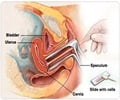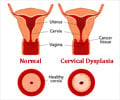Women vaccinated against HPV (human papillomavirus) have a significantly lower risk of developing cervical cancer, and the positive effect is most notable for women vaccinated at a young age, reports the new study.

‘HPV vaccination may significantly decrease the risk of cervical cancer, and the positive effect is most notable for women who are vaccinated at a young age.
’
Read More..




HPV is a virus group that commonly causes genital warts and different types of cancer, including cervical cancer. This disease globally kills over 250,000 women per year. Over 100 countries have implemented national vaccination programs against HPV.Read More..
The study followed 1.7 million girls and women who were between ages 10 to 30. Of them, 527,871 had got at least one dose of the vaccine during the study, most before age 17. Cervical cancer was diagnosed in 19 vaccinated women and 538 unvaccinated women during the study period.
The risk of developing cervical cancer was decreased by 88 percent in women who had been vaccinated prior to age 17, and by 53 percent in those vaccinated between ages 17 and 30, reports the study. This confirms that HPV vaccination prevents advanced cervical precancer.
"Girls vaccinated at a young age are more protected, presumably because they are less likely to have been exposed to HPV infection and given that HPV vaccination has no therapeutic effect against a pre-existing infection," states study co-author Pär Sparén.
In conclusion, the study strongly supports continuing HPV vaccinations of children and teenagers through national vaccination programs.
Advertisement















